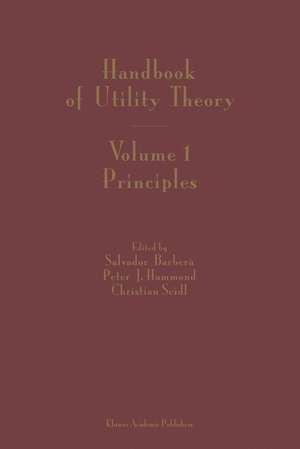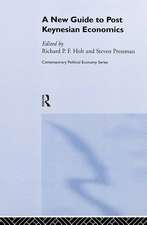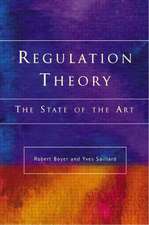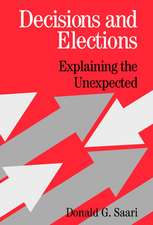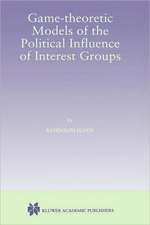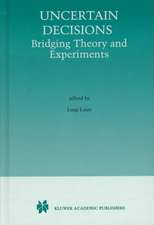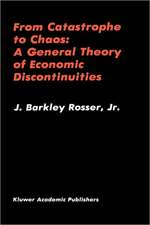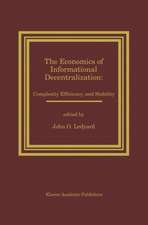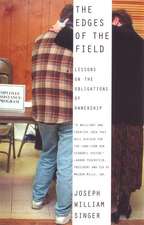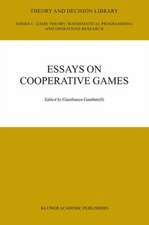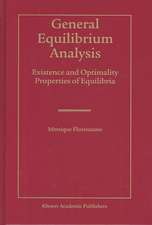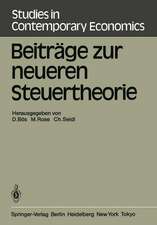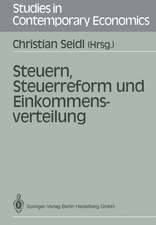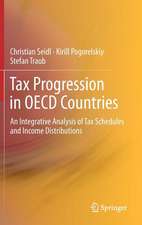Handbook of Utility Theory: Volume 1: Principles
Editat de Salvador Barbera, Peter Hammond, Christian Seidlen Limba Engleză Hardback – 28 feb 1999
The main purpose of the Handbook of Utility Theory is to make recent developments in the area more accessible. The editors selected a number of specific topics, and invited contributions from researchers whose work had come to their attention. Therefore, the list of topics and contributions is largely the editors' responsibility. Each contributor's chapter has been refereed, and revised according to the referees' remarks.
This is the first volume of a two volume set, with the second volume focusing on extensions of utility theory.
| Toate formatele și edițiile | Preț | Express |
|---|---|---|
| Paperback (1) | 2108.42 lei 6-8 săpt. | |
| Springer Us – 5 noi 2010 | 2108.42 lei 6-8 săpt. | |
| Hardback (2) | 2156.36 lei 6-8 săpt. | |
| Springer Us – 31 mar 2004 | 2156.36 lei 6-8 săpt. | |
| Springer Us – 28 feb 1999 | 2435.94 lei 6-8 săpt. |
Preț: 2435.94 lei
Preț vechi: 2970.65 lei
-18% Nou
Puncte Express: 3654
Preț estimativ în valută:
466.13€ • 498.44$ • 388.64£
466.13€ • 498.44$ • 388.64£
Carte tipărită la comandă
Livrare economică 18 aprilie-02 mai
Preluare comenzi: 021 569.72.76
Specificații
ISBN-13: 9780792381747
ISBN-10: 0792381742
Pagini: 684
Ilustrații: X, 684 p.
Dimensiuni: 156 x 234 x 43 mm
Greutate: 1.18 kg
Ediția:1999
Editura: Springer Us
Colecția Springer
Locul publicării:New York, NY, United States
ISBN-10: 0792381742
Pagini: 684
Ilustrații: X, 684 p.
Dimensiuni: 156 x 234 x 43 mm
Greutate: 1.18 kg
Ediția:1999
Editura: Springer Us
Colecția Springer
Locul publicării:New York, NY, United States
Public țintă
ResearchCuprins
1. Preference and Utility; G.B. Mehta. 2. Separability: A Survey; C. Blackorby, D. Primont, R.R. Russell. 3. Recursive Utility and Dynamic Programming; P.A. Streufert. 4. Dual Approaches to Utility; M. Browning. 5. Objective Expected Utility; P.J. Hammond. 6. Subjective Expected Utility; P.J. Hammond. 7. Stochastic Utility; P.C. Fishburn. 8. Fuzzy Utility; M. Salles. 9. Lexicographic Utility and Orderings; J.E. Martínez-Legaz. 10. Utility Theory and Ethics; P. Mongin, C. d'Aspremont. 11. Measures of Economic Welfare; M. Ahlheim. 12. Changing Utility Functions; H. Shefrin. 13. Causal Decision Theory; J.M. Joyce, A. Gibbard.
Recenzii
`... will be welcomed by anybody interested in the foundations and problems of utility theory... this is a very valuable handbook...'
Kyklos, 53:1 (2000)
Kyklos, 53:1 (2000)
Descriere
Descriere de la o altă ediție sau format:
The standard rationality hypothesis is that behaviour can be represented as the maximization of a suitably restricted utility function. This hypothesis lies at the heart of a large body of recent work in economics, of course, but also in political science, ethics, and other major branches of the social sciences. Though this hypothesis of utility maximization deserves our continued respect, finding further refinements and developing new critiques remain areas of active research. In fact, many fundamental conceptual problems remain unsettled. Where others have been resolved, their resolutions may be too recent to have achieved widespread understanding among social scientists. Last but not least, a growing number of papers attempt to challenge the rationality hypothesis head on, at least in its more orthodox formulation. The main purpose of this Handbook is to make more widely available some recent developments in the area. Yet we are well aware that the final chapter of a handbook like this can never be written as long as the area of research remains active, as is certainly the case with utility theory. The editors originally selected a list of topics that seemed ripe enough at the time that the book was planned. Then they invited contributions from researchers whose work had come to their attention. So the list of topics and contributors is largely the editors' responsibility, although some potential con tributors did decline our invitation. Each chapter has also been refereed, and often significantly revised in the light of the referees' remarks.
The standard rationality hypothesis is that behaviour can be represented as the maximization of a suitably restricted utility function. This hypothesis lies at the heart of a large body of recent work in economics, of course, but also in political science, ethics, and other major branches of the social sciences. Though this hypothesis of utility maximization deserves our continued respect, finding further refinements and developing new critiques remain areas of active research. In fact, many fundamental conceptual problems remain unsettled. Where others have been resolved, their resolutions may be too recent to have achieved widespread understanding among social scientists. Last but not least, a growing number of papers attempt to challenge the rationality hypothesis head on, at least in its more orthodox formulation. The main purpose of this Handbook is to make more widely available some recent developments in the area. Yet we are well aware that the final chapter of a handbook like this can never be written as long as the area of research remains active, as is certainly the case with utility theory. The editors originally selected a list of topics that seemed ripe enough at the time that the book was planned. Then they invited contributions from researchers whose work had come to their attention. So the list of topics and contributors is largely the editors' responsibility, although some potential con tributors did decline our invitation. Each chapter has also been refereed, and often significantly revised in the light of the referees' remarks.
